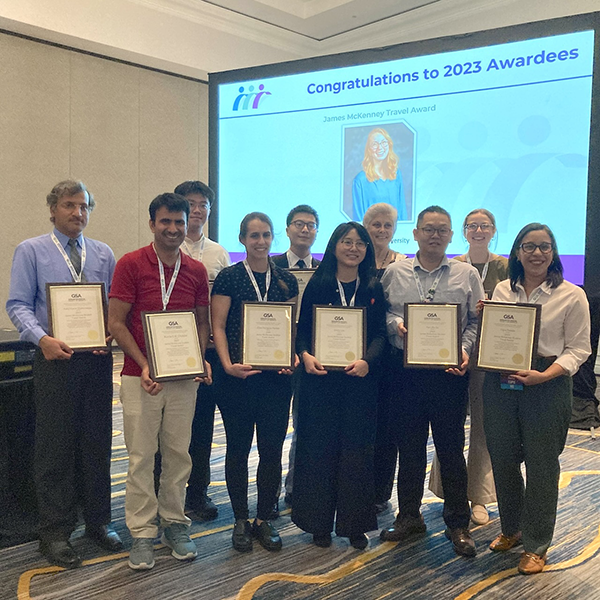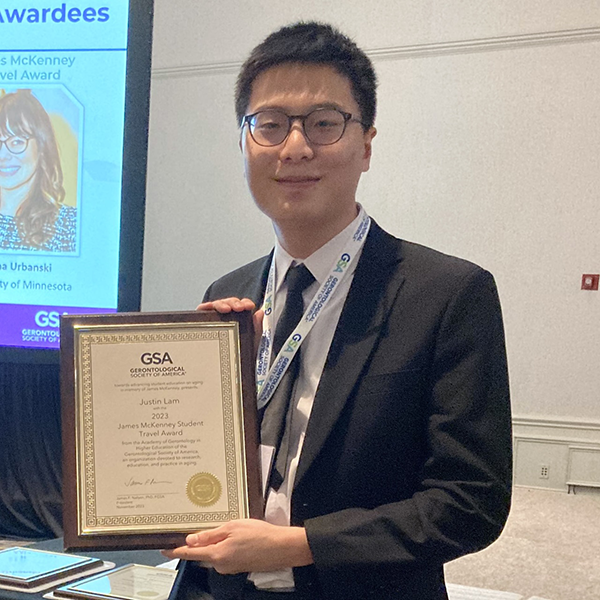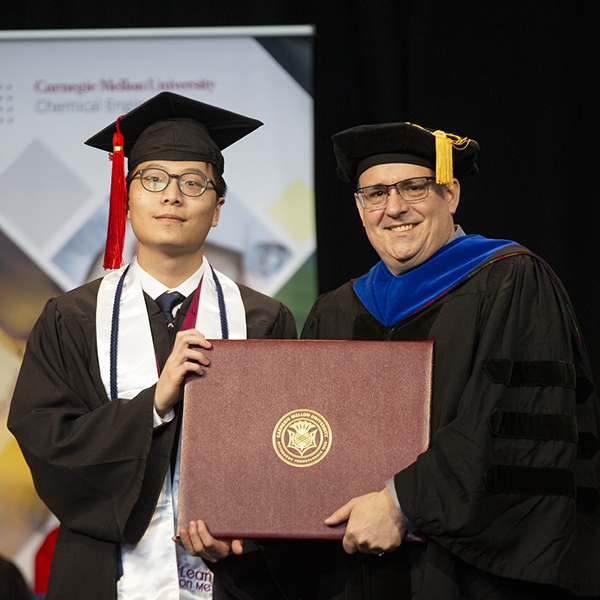Engineering for older adults
As an undergraduate student in the College of Engineering, Justin Lam was able to design his own major track inspired by his passion for helping aging populations, which he called geriatric engineering.
Justin Lam graduated this May, receiving his undergraduate degree for his dual major in Biomedical Engineering (BME) and Chemical Engineering. He enjoys the kinds of hobbies that you might expect a typical college student to enjoy—reading, playing video games, spending time with friends. But his passion for community health and the wellbeing of older populations sets him apart from his young peers.
In high school, Lam lost his grandmother, an important figure in his life who experienced isolation and dementia and passed shortly after having hip surgery. Lam shared, “The mortality rate for older adults with hip fractures isn’t really that great. About 50% survive around a year after their surgery.
While reflecting on his high school search for the right university to attend, Lam said, “I found that there was no shortage of opportunities here at CMU and in the Pittsburgh region.” He chose to attend CMU and, in his first year, began getting involved in research. His first opportunity was in the Health and Human Performance Lab, overseen by David Creswell, a professor of psychology in CMU’s Dietrich College of Humanities & Social Sciences, as well as the Neuroscience Institute. This lab was studying healthy aging by administering and analyzing psychological and cognitive tests to older adults, such as the Stroop test and implicit association tests.
I found that there was no shortage of opportunities here at CMU and in the Pittsburgh region.
Justin Lam, Alumnus, Biomedical Engineering and Chemical Engineering
In his second year, Lam branched out to neurological research, joining the Biohybrid and Organic Robotics Group. The group is overseen by Victoria Webster-Wood, an associate professor of mechanical engineering. This research group takes inspiration from animal capabilities and behavior to improve robotics, including studying their neurology. Alongside Ph.D. candidate Ashlee Liao, Lam studied how hippocampal neurons grow and develop at different points in time.
Liao suggested that Lam apply to ENGAGED, a program offered through the Wake Forest University School of Medicine that connects underrepresented students with research opportunities and mentorship related to health disparities in aging. Lam was accepted and spent the summer between his sophomore and junior years working with Ashley Weaver, an associate professor of biomedical engineering at Wake Forest. They focused on the proximal femur bone, which often requires hip surgery in older adults, and developing computer models to study potential fractures in that area.
At this point in his undergraduate career, Lam decided to create his own biomedical engineering track, which he called geriatric engineering. He worked with Conrad Zapanta, a professor of biomedical engineering and Lam’s advisor, to select courses to complete this specific degree that focused on Lam’s interest: designing assistive devices with older adults in mind. One of the formative classes he took was Rehabilitation Engineering taught by Edmund LoPresti. In this group project course, Lam and his classmates developed a tongue-operated device that quadriplegics can use to communicate with caregivers, which received an award from the Rehabilitative Engineering and Assistive Technology Society of North America (RESNA).
In his junior and senior years, Lam also did research with the Inclusive Mobility Research Laboratory, overseen by Clive D’Souza, an assistant professor in the Department of Rehabilitation Science and Technology at the University of Pittsburgh. Here, the focus was making autonomous vehicles accessible to older adults.
As autonomous vehicles grow in popularity, Lam is concerned that considerations will not be made for older adults in designs. “There isn’t always a driver to help them out with getting in and out of the vehicle,” Lam explained. “And that step can be very difficult because that’s where these major osteoporotic fractures happen.”
In the fall 2023, as a senior, Lam was able to present a poster on the topic at the Gerontological Society of America (GSA). The GSA even selected Lam for the James McKenney Student Travel Award, a competitive financial package that eases the burden of travel for students.
When Lam was not working on schoolwork or research, he was still helping the CMU and Pittsburgh communities. He served as a leader with two student organizations that provide mental health support; as chapter president of Lean On Me and webmaster for Here For You. Student groups like these helped to make Wellness Week a success in the College of Engineering.
He also served as a Peer Health Advocate for students, specializing on supporting those with disabilities, and was a scholar with Age-Friendly Greater Pittsburgh, a group that addresses issues of ageism in the region. He even gave a talk for Global Accessibility Awareness Day with CMU’s Digital Accessibility Office entitled “Reframing Language to Promote Age-Inclusive Digital Spaces.”
Lam, who just graduated, plans to continue his research in assistive medical devices for older adults. He will be attending medical school at the Donald and Barbara Zucker School of Medicine at Hofstra/Northwell in the fall of 2024.



